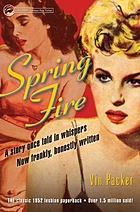Lesbian pulp always seems like a better idea than it actually is. This stuff might have been great in the 50s, but I think nowadays it's probably best read aloud or performed as camp/melodrama.
It was different when I could say it wasn't this way, that I was bisexual and all that rot. Bisexual--that's sort of like succotash, isn't it? Only this succotash hasn't got any corn in it. It's straight beans!"
I'm possibly being insensitive to the bravery of this "story once told in whispers now frankly, honestly written," (not to mention to bisexuals by including the above quote) but it just didn't grab me.
Susan "Mitch" Mitchell pledges a sorority and immediately falls for her sister/roommate Leda Taylor, who turns out to be something of a manipulative narcissist. Some of the most interesting aspects of the novel are the details about sorority and college life in the 1950s. I expected to enjoy it more than I did Beebo Brinker because I remember liking M.E. Kerr's YA books. (Kerr and Packer are both pen names for Marijane Meaker.) I do think it's mostly the weird, stilted writing style of the time that doesn't appeal to me. There are some passages that are a little more rich and nuanced than the majority of the book is.
As a librarian, or maybe just as anyone, I was saddened by a scene where Mitch looks up "lesbian" in a library book, and unfortunately it is condemning, rather than comforting.
"The female homosexual, the Lesbian, often preys on girls who are not true homosexuals. Such girls may enjoy men, and be capable of a normal heterosexual life if they do not become more involved with a genuine Lesbian type, whose technique is often more skillful than that of many of her young suitors."
You've gotta love the "more skillful" part, though. And you know what else is funny? Mitch's male love interest in the end's name is Lucifer.
This book is also seriously flawed in that there are no cats in it whatsoever. Meaker's photo on Wikipedia shows her with a cat in her lap, so she has probably since redeemed herself.
